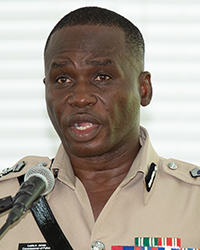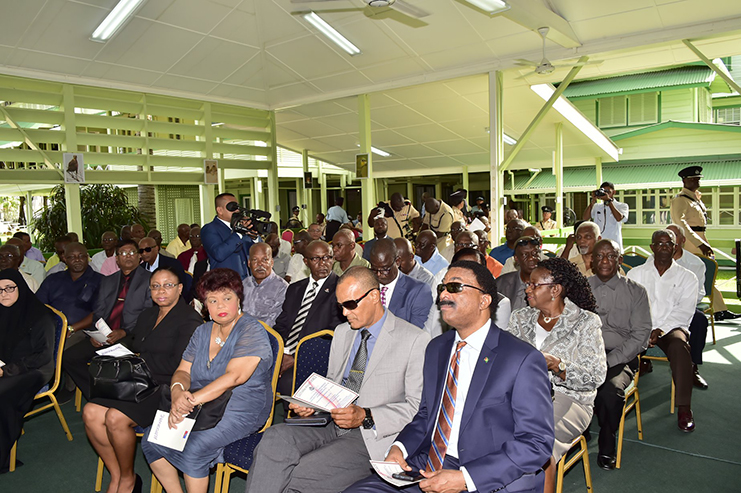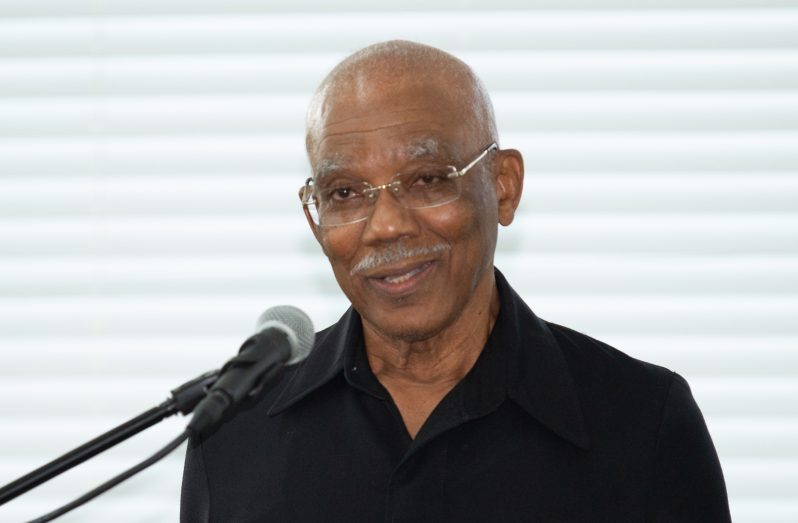— President outlines as top priorities at annual Police Officers’ Conference
IT is widely accepted that the Guyana Police Force’s membership of about 4,600 ranks is inadequate since Guyana’s geographic peculiarities, particularly its rough hinterland terrain, place an additional strain on the Force’s resources.
This observation was made by President David Granger during his address on Thursday morning at the opening of the annual Police Officers’ Conference held for the first time at the Baridi Benab, State House.

The 180th anniversary will conclude Saturday and is being held under the theme “Security Sector Reform Implementation – Enhancing Capacity Through Training, Infrastructure and Human Resource Management”.
He told the gathering of senior officers and special invitees that the safety of citizens and the security of the state and the stability of the economy are the government’s paramount concern.
“A safe, secure and stable country allows citizens to go about their everyday business without fear. Such a State protects citizens and their property and ensures an enabling environment for leisure and lawful economic activities,” the President said.
He also noted that for the police force to maintain public security, it must enjoy public trust. The idea of public trust, he said, arises out of the relationship between the police and the public.
Further, President Granger made it clear that the days of concealing the security sector mistakes and misdeeds are over.
“The Force’s officers will be held accountable for the consequences of their actions and for the instructions that they issue to their subordinates,” he said.

The Commander-in-Chief continued: “The Force is not merely one for shine shoes and soft raiment. It is not an organisation only for desk-bound clerks and land-lubbers…The Guyana Police Force can fulfill its tasks effectively only if it is commanded by a corps of officers who are competent, committed and uncorrupted. The Force’s most senior officers must be men and women of proven independence, integrity and intelligence. The Force must be able to enjoy the trust of the public,” the President said.
CORRECT PROBLEMS
Nevertheless, the President issued a call on senior officers to visit, inspect, report and correct problems which arise in the various police divisions.
“Every barrack room, bicycle, boat, constable, horse, kitchen, station, stable and vehicle must be checked-daily, weekly, monthly and annually, by a supervising subordinate or gazetted officer to ensure that they are fit and proper for the role,” he said.

Turning his attention to the Police Service Commission and its role in rebuilding public trust, President Granger explained that if fairly applied, its powers of promotion can re-establish the principle of merit; discipline and dismissal can encourage probity and discourage misconduct. Moreover, the commission’s independent status can contribute to enhancing public trust in the Force, boosting the morale of officers and ensuring the efficacy of law enforcement.
Article 212 (1) of the Constitution vests the Police Service Commission, which the government reconvened on August 9, 2018, with the “…power to make appointments to any offices in the police force of or above the rank of Inspector, the power to exercise disciplinary control over persons holding or acting in such offices and the power to remove such from office…”
The President said that given the current security situation in Guyana, this is an important mandate to fulfil.
“The commission’s support for the objectives of security sector reform can ensure that there will be, within the Force, a corps of senior officers committed to effective police administration, operations, investigation and intelligence-gathering, ensuring sound leadership to subordinate officers and constables; and evincing the virtues of intelligence and integrity and being capable of securing the public’s trust. The appointment of the commission, therefore, is essential to police force efficiency and to state security,” the President said.
Like the Police Service Commission, he said the Police Complaints Authority, which was re-established on September 12, 2018, is equally important for the maintenance of law and order and public safety.
The authority, the President said, is an independent body vested with powers to receive “complaints of specified cases of misconduct by members of the Police Force” and “supervise investigation of certain serious crimes alleged to have been committed by members of the police force”.
The Head of State said too that, “the authority can engender public trust: by serving as a critical link between the police and the public and providing a means through which the public could have its grievances against police malpractice addressed in an impartial manner by an independent body; and by ensuring that the Force’s actions are in conformity with respect for human rights, including the right to life and liberty – rights which are guaranteed by the Constitution.”
REFORMS
He also called on both the Police Service Commission and the Police Complaints Authority to ensure that the approved reforms, which the Guyana Police Force has embarked on, are effectively carried out.
The reforms, he said, are aimed at improving public trust and confidence, developing a stronger organisation, boosting the Force’s intelligence, response and investigative capabilities and producing a more versatile police officer.
“Security sector reform, therefore, must be accelerated to strengthen this vital national institution in 2019. Security sector reform will revise the Force’s institutional framework. A new leadership team has been installed within the Force. Police divisions are being restructured to correspond to regional divisions; commanders for hinterland divisions will no longer endure the urban discomfort of Eve Leary but will live and work in more pleasant hinterland regions,” the President said.
Further, addressing the problems of chronic under-funding, lack of adequate planning and the low standards identified in the ‘Combe Report’, the President said there is need for the Force to reverse actions which promote the poor maintenance and the abuse of its moveable and immoveable assets.
“Pay greater attention to the selection and training of constables and cadets; enhance the welfare of constables and subordinate officers by improving the conditions under which some constables live and work to ensure promotions are based on hard work, honesty and merit,” the President told the gathering of senior officers.
Meanwhile, Commissioner of Police Leslie James said the Force is at a very critical juncture of reformation and thus far, implementation has begun on three main pillars of the reform process. These are training, human resource management and infrastructure.
The commissioner informed the Head of State that since taking over command of the Force, he, along with his four deputies, have met with officers in all police divisions, branches and units across the country.
COLLABORATIVE EFFORT
“We have been demonstrating leadership through a collective effort and at the end of the past year, the Guyana Police Force achieved an 11 per cent reduction in serious crimes,” Commissioner James said.
According to the Commissioner’s report, robbery under arms was reduced by 13.2 per cent while there was a six per cent reduction in road fatalities.
The top cop assured that the Force will remain resolute and focused on maintaining public security in accordance with its mandate; noting that foremost to the Force is the application and execution of strategies to suppress crime and violence and to enhance systems to maintain law and order.
“And we have deliberately put in place and inscribed at all police stations the Latin maxim ‘Audi alteram partem’ which means listen to the other side; that is to be given as a reminder to our ranks in their engagement with our public,” Commissioner James said.





.jpg)








